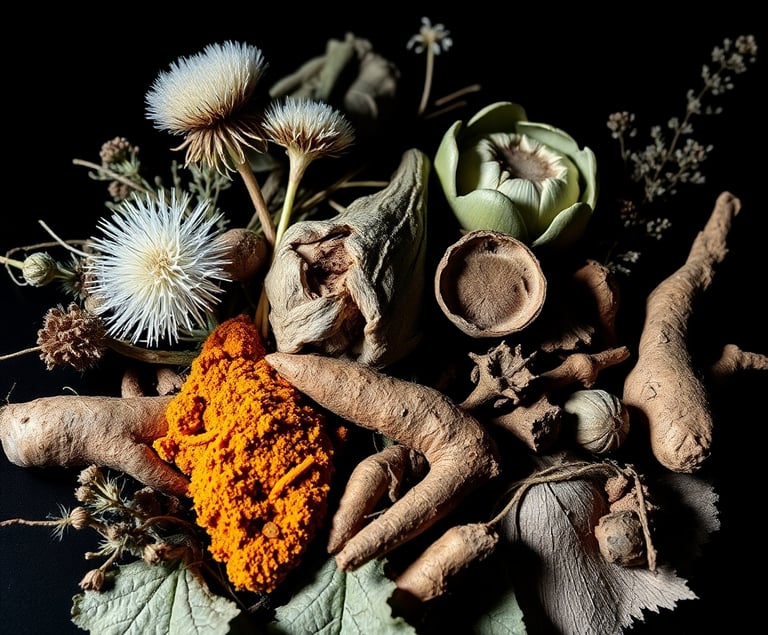
Blog
Herbal Remedy for Liver Cirrhosis
Liver cirrhosis is a chronic, progressive condition in which healthy liver tissue is gradually replaced by scar tissue, impairing the organ's critical functions such as detoxification, protein synthesis, and metabolism. Although conventional treatments focus on managing symptoms and slowing disease progression, many individuals seek complementary approaches to support liver health. Herbal remedies, many of which have been used for centuries, are now being studied scientifically for their hepatoprotective properties. Here are eight herbs that have demonstrated potential benefits for liver support in cirrhosis.
2/8/20252 min read
1. Milk Thistle (Silybum marianum)
Overview:
Milk thistle is one of the most extensively researched herbs for liver health. Its active component, silymarin, exhibits strong antioxidant and anti-inflammatory properties, helping protect liver cells from toxins and promoting regeneration.
Research Evidence:
A systematic review and meta-analysis found that silymarin can improve liver function parameters in patients with liver disease, including cirrhosis.
(1)
2. Dandelion (Taraxacum officinale)
Overview:
Traditionally used as a digestive and diuretic aid, dandelion has been investigated for its ability to reduce oxidative stress and inflammation in the liver. Its antioxidant compounds may help protect against toxic injury.
Research Evidence:
A study demonstrated that dandelion extract exerted hepatoprotective effects against chemically induced liver damage.
(2)
3. Artichoke (Cynara scolymus)
Overview:
Artichoke extract is known to stimulate bile production and enhance detoxification processes. Its potent antioxidant properties may help safeguard liver cells against oxidative damage.
Research Evidence:
Clinical research has shown that artichoke extract can improve liver enzyme levels and antioxidant status, supporting overall liver health.
(3)
4. Turmeric (Curcuma longa)
Overview:
Turmeric’s key active compound, curcumin, is renowned for its anti-inflammatory and antioxidant capabilities. In liver disease models, curcumin has been observed to reduce inflammation and slow the progression of fibrosis.
Research Evidence:
Preclinical studies indicate that curcumin supplementation can attenuate liver fibrosis and reduce inflammatory markers in cirrhosis.
(4)
5. Schisandra (Schisandra chinensis)
Overview:
Schisandra is a staple in traditional Chinese medicine, valued for its adaptogenic and hepatoprotective effects. It helps improve liver enzyme profiles and reduce oxidative stress, thereby supporting liver function.
Research Evidence:
Studies have demonstrated that Schisandra chinensis exhibits anti-fibrotic and hepatoprotective effects in various experimental models.
(5)
6. Licorice Root (Glycyrrhiza glabra)
Overview:
Licorice root has long been used in traditional medicine for its anti-inflammatory and antioxidant properties. Research suggests that licorice extract may help mitigate liver injury by reducing oxidative stress and modulating inflammatory pathways.
Research Evidence:
Investigations have shown that licorice can exert protective effects against liver damage, supporting its role as an adjunct therapy in liver disorders.
(6)
7. Andrographis paniculata
Overview:
Often referred to as the “King of Bitters,” Andrographis paniculata has been studied for its potent anti-inflammatory and hepatoprotective properties. Its active constituent, andrographolide, may help reduce liver inflammation and oxidative damage.
Research Evidence:
Experimental studies suggest that andrographolide can improve liver function and reduce fibrosis in animal models of liver injury.
(7)
8. Phyllanthus niruri
Overview:
Phyllanthus niruri is traditionally used for liver ailments, particularly in the context of viral hepatitis. Its antioxidant and antiviral properties contribute to its hepatoprotective potential, helping to prevent liver cell damage.
Research Evidence:
Studies have reported that extracts of Phyllanthus niruri can protect liver cells against toxic insults and improve biochemical markers of liver function.
(8)


Final Thoughts
While liver cirrhosis is a serious condition requiring close medical supervision, these herbal remedies offer promising supportive benefits. Milk thistle, dandelion, artichoke, turmeric, schisandra, licorice root, Andrographis paniculata, and Phyllanthus niruri have all demonstrated hepatoprotective properties through various mechanisms, including antioxidant, anti-inflammatory, and anti-fibrotic effects. Although these herbs are not cures for cirrhosis, they can serve as valuable adjuncts in a comprehensive treatment plan that includes lifestyle modifications and conventional medical therapies. Always consult with a healthcare provider before adding any herbal supplement to ensure that your treatment approach is safe, effective, and tailored to your individual needs.


